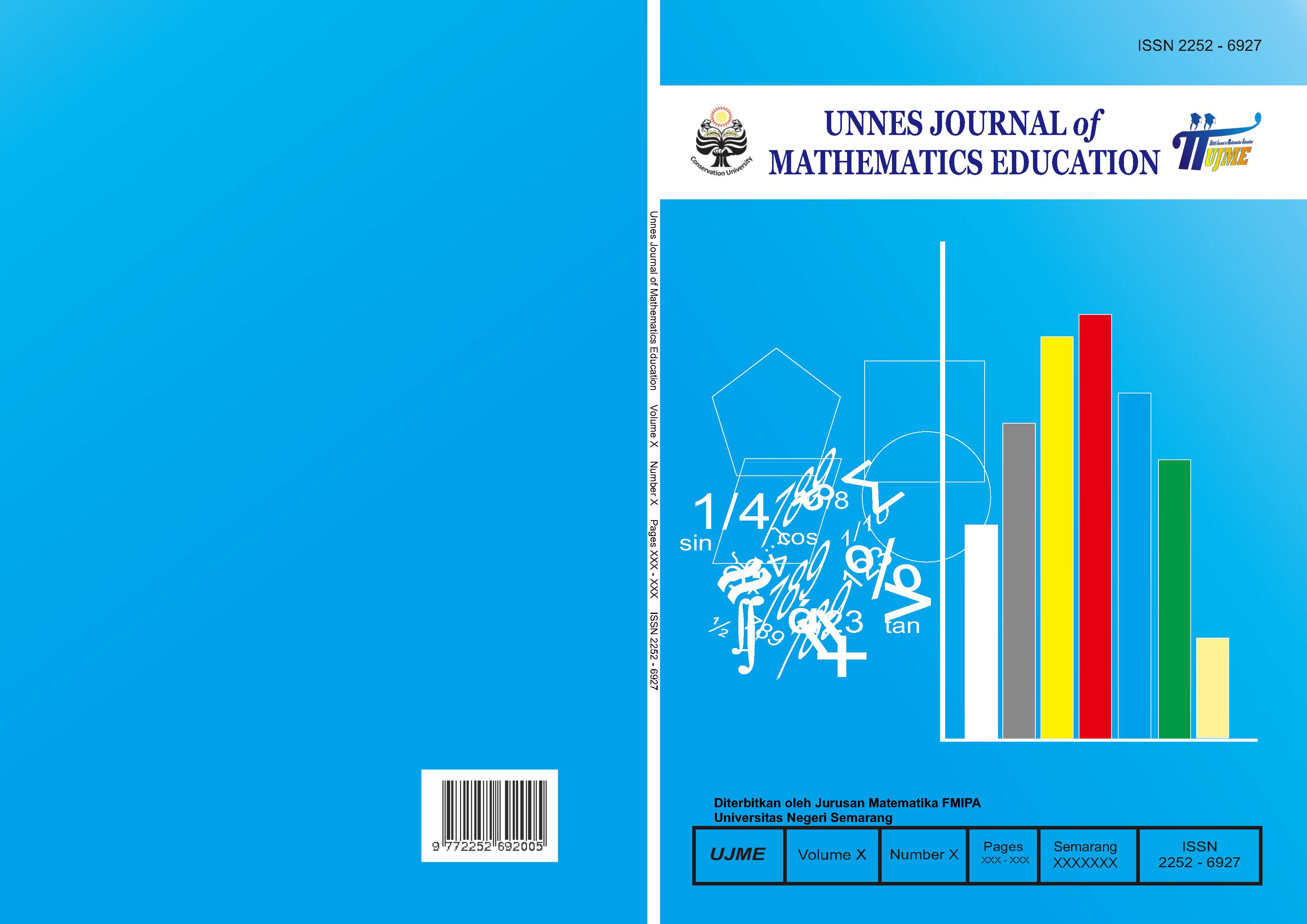ANALISIS KEMAMPUAN BERPIKIR ALJABAR DALAM MATEMATIKA PADA SISWA SMP KELAS VIII
##plugins.themes.academic_pro.article.main##
Abstract
Berpikir aljabar merupakan representasi dari aktivitas maupun kemampuan dalam mempelajari aljabar sekolah. Tujuan penelitian ini adalah untuk mengetahui kemampuan berpikir aljabar siswa SMP Kelas VIII. Metode penelitian yang digunakan adalah dengan pendekatan deskriptif kualitatif. Penelitian ini dilakukan dengan memberikan tes kemampuan berpikir aljabar pada siswa. Selanjutnya berdasarkan hasil tes, siswa dikelompokkan berdasarkan kemampuan berpikir aljabar mereka yang terdiri dari kelompok tingkat tinggi, kelompok tingkat sedang, dan kelompok tingkat rendah. Dari masing-masing kelompok tersebut dipilih dua subjek sebagai perwakilan untuk diwawancara lebih lanjut terkait kemampuan berpikir aljabar mereka. Hasil analisis dari penelitian ini menunjukkan bahwa kemampuan generasional, transformasional, dan level-meta global sudah terlihat pada sebagian siswa kelas VIII. Siswa yang termasuk dalam kelompok tingkat tinggi mempunyai kemampuan generasional, transformasional, dan level-meta global yang cenderung tinggi. Sedangkan siswa dalam kelompok rendah mempunyai kemampuan transformasional yang cenderung rendah, kemampuan generasional yang rendah sampai sedang, dan kemampuan level-meta global yang rendah sampai sedang.
Algebraic thinking is a representation of activities and abilities to learn school algebraic. The aim of this research was to determine the ability of eighth grade junior high school students in algebraic thinking. The method used in this research was the qualitative descriptive approach. This research was conducted with giving a test of algebraic thinking skills to the students. Furthermore, based on test results, students are grouped according to their algebraic thinking skills which consists of a highÂlevel group, moderateÂlevel group and lowÂlevel group. From each group, two subjects were selected to be interviewed more related their algebraic thinking skills, as a representative for their each group. Analytical results from this research indicated that the ability in generational, transformational, and global metaÂlevel activities is already visible in some eighth grade students. Students were included in the highÂlevel group tend to have high skill in generational, transformational, and global metaÂlevel activities. While students were included in the lowÂlevel group tend to have low skill in transformational ability, low to medium skill in generational ability, and low to medium skill in global metaÂlevel ability.
##plugins.themes.academic_pro.article.details##
References
Balitbang. 2011. Survei Internasional TIMSS. Jakarta: Kementerian Pendidikan dan Kebudayaan.
Carpenter, T. P., L. Levi, M. L. Franke, & J. K. Zeringue. 2005. Algebra in Elementary School: Developing Rational Thinking. ZDM, 37(1): 53-59.
Coles, A. & L. Brown. 1998. Developing Algebra – A Case Study of The First Lessons From The Beginning of Year 7. Proceedings of the British Society for Research into Learning Mathematics. UK: BSRLM.
Katz, V. J. 2007. Algebra: Gateway to a Technological Future. Columbia: University of the District of Columbia.
Kieran, C. 2004. Algebraic Thinking in the Early Grades: What Is It?. The Mathematics Educator, 8(1): 139-151.
Radford, Luis. 2001. Factual, Contextual and Symbolic Generalizations in Algebra. PME CONFERENCE, 4: 4-81.
Radford, Luis. 2006. Algebraic Thinking and The Generalization of Patterns: A Semiotic Perspective. Proceedings of the 28th annual meeting of the North American Chapter of the International Group for the Psychology of Mathematics Education. Mérida, México: Universidad Pedagógica Nacional.
Satoto, S., Sutarto, H., & Pujiastuti, E. 2013. Analisis Kesalahan Hasil Belajar Siswa dalam Menyelesaikan Soal dengan Prosedur Newman. Unnes Journal of Mathematics Education, 1(2). Available in http://journal.unnes.ac.id/sju/index .php/ujme [accessed 29-12-2015].
Suhaedi, Didi. 2013. Peningkatan Kemampuan Komunikasi Matematis, Berpikir Aljabar, dan Disposisi Matematis Siswa SMP Melalui Pendekatan Pendidikan Matematika Realistik. Disertasi. Bandung: Universitas Pendidikan Indonesia.
Suherman, E., Turmudi, D. Suryadi, T. Herman, Suhendra, S. Prabawanto, Nurjanah, & A. Rohayati. 2003. Strategi Pembelajaran Matematika Kontemporer. Bandung: Jurusan Pendidikan Matematika FMIPA UPI.
Thomas, P. E. 1999. Critical Thinking Instruction in Selected Greater Los Angeles Area High Schools. Disertasi. California: Azusa Pacific University.
Tjalla, A. 2009. Potret Mutu Pendidikan Indonesia Ditinjau dari Hasil-hasil Studi Internasional. Jakarta: Universitas Negeri Jakarta. Available in pustaka.ut.ac.id/pdfartikel/TIG601.pdf [accessed 10-9-2015].
